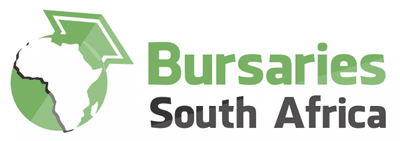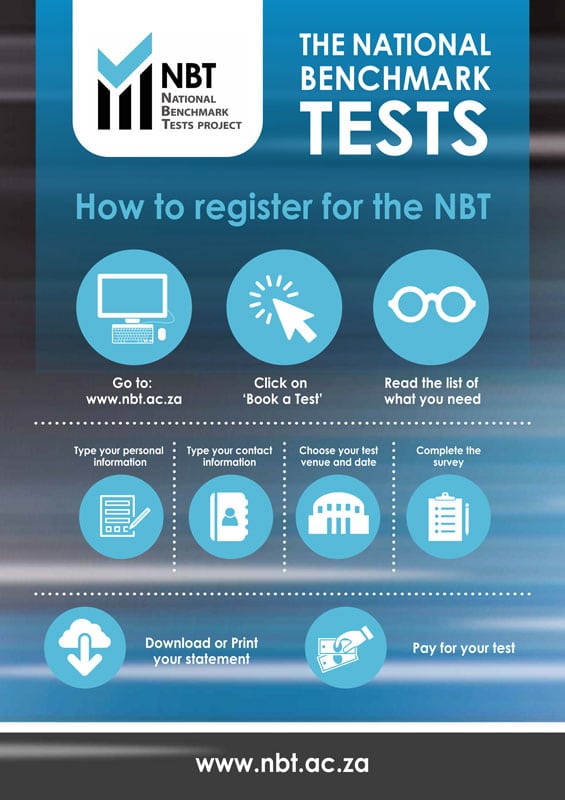National Benchmark Test (NBT) for University Entrance
NBT registrations are now OPEN for the 2024 intake cycle – see below how to register.
What is the National Benchmark Test (NBT)?
The National Benchmark Test (NBT) is a test that first-year applicants must pass in order to begin studies at higher education institutions – essentially it tests their readiness for university study. The test is used to measure the students ability to transfer understanding of language skills, numerical skills and mathematics skills to meet the demands of higher education coursework.
The NBT has 2 types of tests, which each measure different skills, as stated above. Each test requires candidates to use their prior knowledge and experience, to assess whether first year students meet the expectations of the specific university programmes.
The NBTP was commissioned in 2005 by the HESA (Higher Education Statistics Agency).
What are the 2 types of NBT tests?
The Academic and Quantitative Literacy Test (AQL):
Consists of 2 sections that are reported individually. The test determines:
- the students capacity to engage successfully with the demands of academic study in the medium of instruction provided.
- the students ability to manage situations or solve problems in a real context that is relevant to higher education study, using basic quantitative information that may be presented verbally, graphically, in tabular or symbolic form.
The Mathematics Test (MAT):
The test determines:
- the student’s ability related to mathematical concepts formally regarded as part of the secondary school curriculum.
The AQL test is generally written for all programmes, while the MAT test is generally written for programmes that require Mathematics (Engineering, Accounting, Health Science and other Sciences). This will be determined by each University and faculty.
Which institutions require students to write the NBT’s?
Every University has its own admission criteria and policies – students should check with their specific institution whether the NBT tests are required (this can be found on university websites and in their prospectus).
When can I write the NBT’s?
- Find the list of national test dates for 2023 & 2024 here
- Find the test venues in all provinces here
Note: the NBT National Test Sites schedule is regularly updated to indicate site changes and number of seats available.
How can I write the NBT’s?
NBT tests are held online and in-person. Before writing the NBT test, candidates must follow these instructions:
Writing the NBT tests in-person
First, you will need to register online
(It is advised to use Internet Explorer or Firefox, as there have been issues with the test on Google Chrome).
Candidates must have the following when registering:
- South African ID book (or passport if you are not a South African citizen)
- Date when you would like to write (note: allow for 4 weeks to receive results)
- City and site where you would like to write
- NBT requirements from the institutions where you intend on studying
- Pen and paper to write down your username and EasyPay number
The username (ID or Passport number) and password are used to: complete the registration process if you did not finish, correct personal information and request change to test date or site.
The EasyPay number during registration is used to verify payment so that your results may be released.
Candidates will receive confirmation of their test venue 2 days before the test (via SMS and email).
Writing the NBT tests online
Learners who are unable to write at the physical site (due to being in another country or in an area too remote to travel to the site), may complete the test online, under the guidance of a test proctor/ invigilator.
Writers taking the test online, must do so in a secure proctored online environment. Learners will be monitored throughout the test to ensure they follow all testing procedures. The test session will be recorded.
Find out how to Register as a Remote/ Online Writer here
Important: read the following documents if you will be doing the online test:
If you are registering to write the NBT’s online, you will be required to complete the compulsory Simulation (after registering). The simulation must be completed by the Wednesday before your online test date: https://cetap.edtest.ai/
Watch the recording of the online Q&A session on How to do Simulation for NBT Online Testing (skip ahead to 07:00 minutes)
Important notes about the NBT tests
- The MAT test cannot be written as a stand-alone test – it must be written in conjunction with the AQL test.
- The AQL test and the MAT test are each written in a 3 hour session – the AQL is written in the morning and the MAT is written in the afternoon, on the same day (learners may not write these tests on different days).
- The AQL test is made up of 7 sections – each of which must be completed within 25 to 30 minutes.
- Both tests are multiple choice questions.
- The deadline for writing and submitting results is determined by university and faculty.
- Test sites may be closed or extra ones opened due to demand – this can be done 4 weeks prior to a test date.
- On the day of the test, you must arrive at the check-in desk by 07:30.
- Learners must ensure that their name and ID number are correctly printed on their answer sheet (which they will receive at check-in). If any information is incorrect, applicants will be given instructions by the Chief Invigilator how to make corrections. Learners must their your ID or passport to an invigilator before the test begins.
- Each month, a Friday or Sunday session is offered to learners who cannot write on Saturday – this is done at major test sites.
- Learners will use their full name (per their official ID or passport) when registering and when writing.
- ID’s and passports will be checked before applicants are allowed to write on test day.
- Learners who fail to report must re-schedule their test and pay for the make-up test session.
- Learners with disabilities should read here
What is the price of the NBT tests?
The 2023 prices are:
- AQL test: R145
- AQL & MAT test: R290
- Re-mark: R250
What should I bring to the NBT test?
On test day, candidates must have the following items with them:
- South African ID book or passport
- 2 sharpened pencils and an eraser
- Lunch and water
- Don’t forget, you also need to have paid the test fee and have checked in by 7:30am
Please do NOT bring the following items:
- Calculator
- Ruler
- Dictionary
- Notebook/ scrap papers
- Cellphone, tablet, iPad, laptop, smart watch
What languages can I write the NBT’s in?
The NBT is available in English and Afrikaans (the common languages of instruction used in South African Institutions). Afrikaans tests are only available on specific dates at test sites across South Africa. Students with disabilities may write the test in Braille.
How can I prepare for the NBT test?
Candidates can prepare by reviewing the NBT exemplar questions (these are just an indication as to the type of questions that will be asked in the test).
- AQL test example (English)
- AQL test example (Afrikaans)
- MAT test example (English)
- MAT test example (Afrikaans)
When will I receive my NBT results?
Institutions will receive results within 4 weeks of candidates writing the test. Candidates will be able to access their results on the NBT website after 5 weeks.
Learners can find out how to obtain their results, as well as the result dates here
Who can I contact for help?
The NBT help desk is available to answer any questions, from Monday to Friday (08:00 to 16:00) and on test weekends (07:00 to 10:00). Contact them on 021 650 3523
Please read the FAQ’s before making any queries.
See which bursaries are open for application here
Read our other tips and articles here:
Read our top tips on submitting your bursary application for the best chance of success.
Read our tips on how to write a bursary motivational letter here.
Read about how to prepare for a bursary interview here here.
Read about the various ways to get free education in South Africa.
Are you following us on social media? We post our latest bursary opportunities and reminders of bursaries closing soon on Facebook, Twitter and Instagram.



This post was last updated in May 2023.
SA Bursaries wishes you the best of luck with your application! Please remember to SHARE this page with anyone you know who may be in need of bursary funding.

